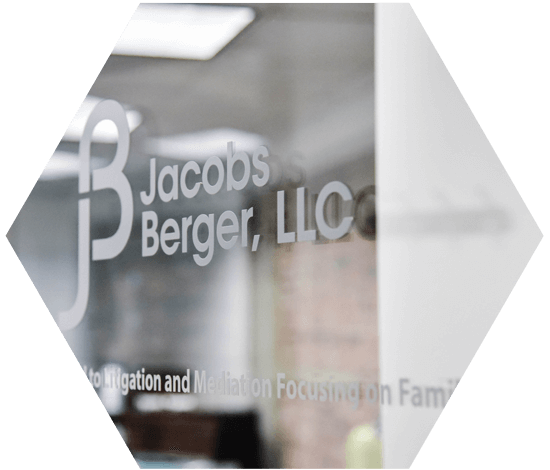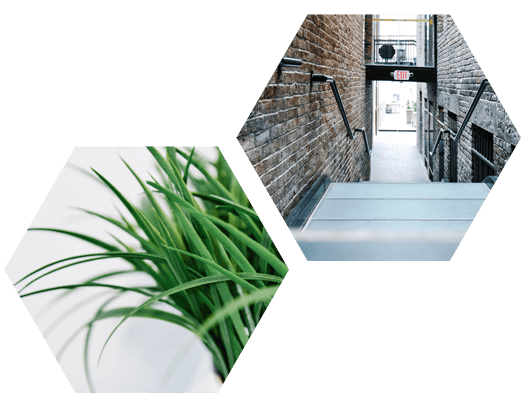Alternatives to Divorce
Morris County Alternative Dispute Resolution Lawyers
Collaborative solutions to meet your needs
When it comes to divorce and other family law matters, many people wish to avoid a long, expensive, and emotionally taxing process—but don’t know their options.
At Jacobs Berger, LLC, our family law attorneys work to guide clients through a legal process that’s focused on solutions and collaboration, known as alternative dispute resolution (ADR).
There are several forms of ADR, including mediation and arbitration. Our alternative dispute resolution lawyers work with you to find the approach—or the combination of methods—that best fits your particular needs.
If you’re getting divorced or have other family law concerns, contact us today for a strategic planning session. Our experienced divorce attorneys can guide you through the process.
What does alternative dispute resolution mean?
Alternative dispute resolution (ADR) is an umbrella term for several different legal alternatives to a court-litigated divorce or family law dispute. In other words, ADR offers other ways of approaching the divorce process that don’t call for a legal battle before a judge.
In ADR, the divorcing parties may choose to work with a trained and neutral third party to reach a divorce settlement. Alternative dispute resolution lawyers are typically part of the process too, with each side having their own legal guidance.
There are several kinds of ADR which exist roughly along a spectrum. On one end, the neutral third party in mediation tries to foster settlement by helping the parties reach jointly agreed-upon decisions. Sometimes, if appropriate, the mediator can make suggestions for ways to resolve certain issues, but the divorcing parties aren’t required to proceed with these suggestions. At the other end, in binding arbitration (a process that’s similar to trial but allows for greater customization and flexibility), both parties must agree to adhere to the arbitrator’s decision.
In New Jersey, ADR is often less expensive and faster than getting divorced in court.
At Jacobs Berger, our alternative dispute resolution lawyers have decades of combined experience in guiding clients through the ADR process—and finding solutions that fit their needs.
When should ADR be used?
In New Jersey, divorcing parties are encouraged to attempt ADR before pursuing a court divorce, but the parties should know that ADR can be used simultaneously with the court system. Certain ADR pathways are also built into the court system to help foster settlement rather than ongoing litigation.
ADR tends to be a faster and less expensive divorce option. It also reduces the pressure on divorcing parties to work against each other. Instead, it necessitates a certain level of collaboration, which can make the process less contentious.
Benefits of ADR for Family Law Matters
There are many benefits for divorcing parties who pursue ADR solutions for their family law matters with the help of alternative dispute resolution lawyers.
In ADR, both sides are responsible for reaching a mutual agreement. Therefore, there’s less likelihood that a cynical, embattled mindset either exists or will last—and ultimately, this push toward collaboration tends to better preserve family relationships.
ADR can be particularly beneficial in family law matters involving children. A less adversarial process makes it easier for parents to support their children in retaining positive relationships with both of them.


With the legal support of their alternative dispute resolution lawyers, the divorcing parties can develop practical solutions while staying informed of their rights and options.
ADR tends to be faster and less expensive than traditional divorce—and it’s also more private. While court records are considered public documents, the details of mediation and arbitration aren’t.
At Jacobs Berger, our alternative dispute resolution attorneys have years of experience in working with families to achieve less stressful divorces through ADR.
Top Alternative Methods of Resolving Disputes
There are several types of ADR, which vary according to the needs of the divorcing parties.
All types of ADR can address:
- Child custody
- Child support
- Alimony, also known as spousal support
- The division of assets and debts
- The division of property
- And more
It’s strongly recommended that disputing parties work with alternative dispute resolution lawyers, whichever type of ADR they choose. Once the parties have come to an agreement on their divorce settlement, the document is submitted to the court for processing and execution together with the required pleadings—after which it’s incorporated within their final judgment of divorce and becomes legally binding.
At Jacobs Berger, we offer mediation, arbitration, and collaborative process options.
Mediation
In mediation, a trained, neutral third party, known as a mediator, guides divorcing spouses (or already divorced parties, co-parents, or other family members) through the divorce process or the family law issue they’re facing.
The mediator makes suggestions and helps both parties arrive at a solution about how they’d like to resolve issues such as child custody or shared finances.
However, the mediator’s suggestions are “non-binding.” This means that the divorcing parties aren’t legally required to include them in the divorce agreement.


Arbitration
Arbitration also involves a neutral third party, but in this case, the process functions more like a trial.
With the aid of their alternative dispute resolution lawyers, both sides present their case to the arbitrator.
In nonbinding arbitration, either party can reject the arbitrator’s decision and then move on to binding arbitration or into the court system. In binding arbitration, parties agree to abide by whatever the arbitrator decides and the right to appeal the arbitrator’s decision is severely limited.
Collaboration
Collaborative divorce is a form of ADR often used by divorcing parties who don’t feel that mediation is the right approach for them—but who also want to avoid litigated divorce.
Collaborative law attorneys are specially trained in resolving family law matters outside of the litigation process. Many are trained by the International Academy of Collaborative Professionals or a state-level certifying body.
In collaborative divorce, the parties work with alternative dispute resolution lawyers—family law and divorce attorneys specifically trained in a particular style of negotiation and conflict management.
These meetings often take into account the expert advice of agreed-upon professionals like accountants, therapists, etc. Often, these parties may participate in settlement conferences or have discussions with both parties and both lawyers.
If the collaborative divorce process is unsuccessful, the attorneys aren’t permitted to represent their clients in court. This stipulation provides extra assurance for the divorcing parties that their attorneys will engage in earnest in the collaborative process—and not focus on the potential for further litigation.


The ADR Process in New Jersey
In New Jersey, divorcing parties using the court system are encouraged to attempt alternative dispute resolution prior to reaching the trial phase of their divorce. In fact, parties aren’t allowed to go to a trial for their divorce if they haven’t engaged in ADR through an Early Settlement Panel (ESP) first. They’re also required to attend Economic Mediation and Intensive Settlement Conferences as part of the court process.
The New Jersey ADR program encourages this alternative to litigation because it’s often in the divorcing parties’ best interest. ADR tends to be less expensive, faster, and less hostile than court-litigated divorce.
Divorcing parties may seek to settle a dispute through mediation, collaborative law, or arbitration.
ADR Divorce Alternative FAQs
ADR is an umbrella term that covers several different divorce alternatives. While the goal of all ADR is ultimately to reach a legally binding final divorce agreement, the point at which ADR becomes legally binding depends on which path you take.
In mediation, the suggestions of a mediator are exactly that—suggestions. They don’t become legally binding unless both parties agree to them and include them in the signed divorce agreement that they file with the court. Once the court processes and executes their divorce, then the terms of the agreement become legally binding.
In another kind of ADR known as binding arbitration, the process can become legally binding much sooner. In binding arbitration, both sides present their case to a third-party arbitrator who makes decisions the parties have to abide by.
ADR is often effective for family law disputes for several reasons.
Since it’s collaborative, there isn’t a “winning” or “losing” side—the divorcing parties must instead work together to reach an agreement. Due to this approach, ADR tends to be less stressful and hostile.
Additionally, it’s often faster and less expensive than a traditional divorce.
In the United States, people always have the option of representing themselves in the legal system—and that holds true for out-of-court dispute resolutions, such as arbitration and mediation.
However, we don’t recommend pursuing ADR without the aid of an alternative dispute resolution lawyer. In binding arbitration, you must present your “case” before an arbitrator who will make a decision about your divorce that you must agree to follow. A lack of legal advice in this scenario can usher in a whole host of setbacks.
By contrast, if you have an attorney on your side in mediation, you’ll typically be better informed of your options, rights, and potential solutions.
Ultimately, the result of mediation and arbitration is a legally binding divorce agreement. This document has a huge impact on your life moving forward, and as such, many people want to have legal support as they work through what the document will say.
Work with Experienced NJ Mediation and Arbitration Lawyers
At Jacobs Berger, LLC, our alternative dispute resolution lawyers have extensive experience and training in representing divorcing parties throughout the ADR process. We’ve served as mediators and collaborative divorce attorneys ourselves and have an intimate knowledge of how ADR works in New Jersey.
We offer a creative, forward-thinking approach to ADR and will work with you to find solutions that meet your needs.
To learn more about alternative dispute resolution options for your divorce, contact us today for a strategic planning session—and begin a simpler, more straightforward approach to your divorce process.


